Sukkot 2021: Celebrating New and Old Traditions
The Festival of Booths is a social time for family and friends to eat together in temporary shelters. The AJT was curious to see how this year’s celebrations adapted to our new normal.
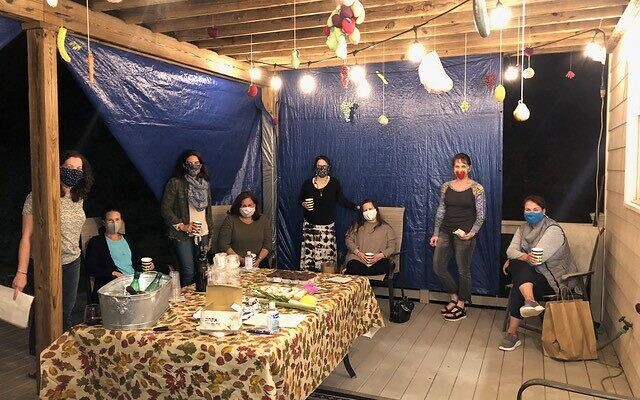
When Yom Kippur ends, the shofar blown, and the twenty-five-hour fast broken, Jews quickly switch gears and begin preparing for the joyous holiday of Sukkot. The Torah-commanded seven-day celebration that begins on the fifteenth day of Tishrei is one of three pilgrimage festivals that requires a temporary structure to be built, specific rituals to be performed in that structure, and special prayers to be said. Sometimes called the Feast of Booths, Sukkot commemorates the 40 years Jews spent in the desert on their way to the Promised Land. Originally, Sukkot was an agricultural festival meant to thank God for a successful harvest.
Male Jews are commanded to build a sukkah, eat their meals in it, and say specific prayers.
While the Torah commands only men celebrate the holiday, it’s a social time when family and friends get together, eat as a group, and have a good time. The AJT was curious to see if this year’s Sukkot celebrations had been impacted by the pandemic.
Beth Tieman Feldstein, a 51-year-old Sandy Springs resident, said Sukkot has always been her favorite Jewish holiday. The Atlanta native has fond memories of friends and family eating in the Northlake home where she grew up, during every night of Sukkot, every year. The same sukkah was built every year, and the decorations were kept and used each year. “We had a lot of decorative fruits that were handsewn. I am still using those decorations,” she said.
Sukkot 2020 was affected by the pandemic. “Instead of sitting in our sukkah, everyone sat outside, with their own table so they could be socially distanced. Last year everyone wore masks.” This Sukkot, the masks came off and friends were back in the sukkah. “We’re all vaccinated,” she explained, “and we’re comfortable together.” Feldstein is part of a Jewish WhatsApp group that she thinks of fondly as “The Sandy Springs shtetl.”
“There are 27 of us,” she said. “We’re of different ages and go to different synagogues, but we’re supportive and there for one another.”
Fifteen women came to the ladies-only Sukkot party. While the Torah gives specific instructions about the ideal size of a sukkah, there are no guidelines regarding what kinds of tables or chairs to use or how to decorate the walls. Some people have their children draw or paint pictures that they laminate and tape to the walls. It’s common to hang colored holiday lights in the sukkah. Photographs of famous rabbis are often seen in those built by Orthodox Jews.
Feldstein always hangs a childhood photograph in her sukkah. The image, taken in 1980, is of her mother, Jeanette Tieman, her sister Andrea, and Beth herself. “We lost my sister,” Feldstein said. “This is just one of the ways to honor and remember her.”
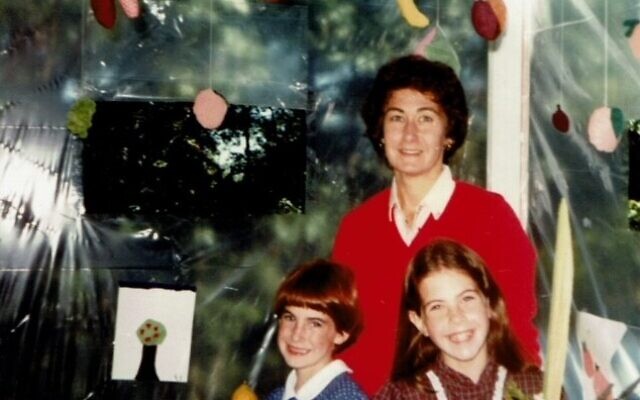
Feldstein likes following the tradition she grew up with of having guests every night of the holiday. When she found out that her husband was going to a Sukkot function for men at Or Hadash, where they are members, she decided to make it a “ladies only” sukkah night.
“It was casual and easy,” she said. “We had desserts and drinks. What made it special was to be able to see everyone without a mask. We’ve had so few facial interactions as we walk our dogs in the neighborhood. It was a good excuse to have a party.”
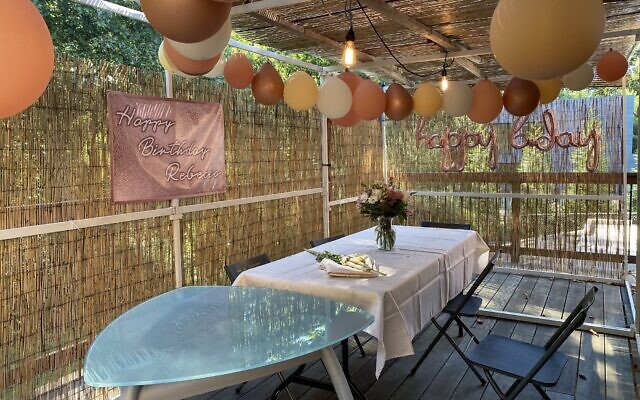
Sukkah parties have always been part of Wendy Solon’s life. “My Mom always did amazing things for Sukkot,” said the 51-year-old Toco Hills resident. “I have so many memories of building the sukkah, decorating it and eating in it with friends and family. For decades my parents had an open house during Sukkot. My Mom baked her famous desserts. She did it for 25 years.” Solon’s mother, Betty Minsk, passed away a year and a half ago.
This year, Solon said Sukkot was impacted more by rain than by COVID. “We made kiddush and hamotzi in the sukkah, went inside to eat because of the rain, and went back outside for dessert.” Solon, who has three daughters, combined her sukkah celebration with her daughter Rebecca’s birthday celebration.
Ed and Lynn Koffsky, who moved to Atlanta 39 years ago from Columbus, Ohio, said that this is the second year they didn’t put up a sukkah. They went to New York for the last days of the holiday to be with their sons and their families.
“We were invited to one family for lunch during the first days of the holiday,” Koffsky said. “No one wore masks. It rained the whole time so we went into the house. Lynn was uncomfortable no one wore masks.” Her brother, Steven S. Lazarus of Thousand Oaks, California, died last year after contracting COVID on a cruise.
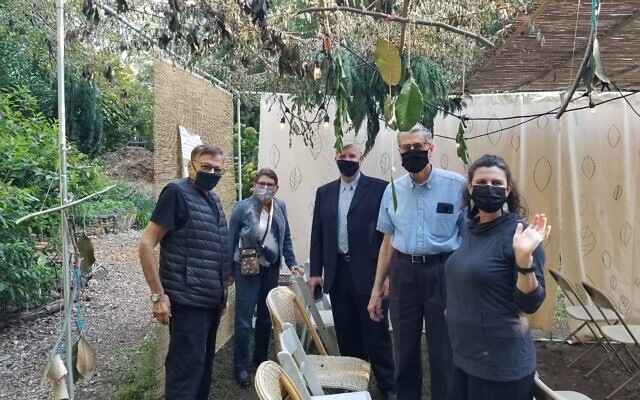
Last but not least, members of Ahavath Achim celebrated the holiday at the Wylde Nature Center in Decatur. As Rabbi Rosenthal explained, “the community sukkah is built with only two walls (and a little bit of the third), which is the halakhic minimum for a sukkah. Therefore, it’s more of an ‘L’ shape so it has a lot of openness allowing for airflow.” To ensure comfort and safety, Rosenthal asked everyone to wear masks. Food and drinks were served from a picnic table outside. The sukkah was put together by JCAN-GA, Jewish Climate Network and GIPL, Georgia Intertfaith Power and Light.
Pope High School
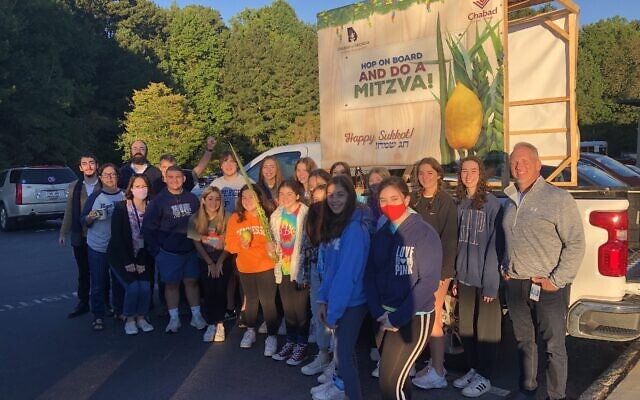 Pope Jewish High School students respond to antisemitism with pride!
Pope Jewish High School students respond to antisemitism with pride!
On Sept. 24 the Pope Jewish Club hosted a Sukkot celebration with the Chabad of Cobb Sukkah Mobile in front of the school.
“It was very encouraging to see students, teachers and the principal join to show solidarity. I think this sends a clear message that there is no space for antisemitism or any form of bigotry in our schools,” said Rabbi Ephraim Silverman of Chabad of Cobb.
“It is important that as a Jewish community we remember that our most powerful response to expressions of Jewish hatred is increased Jewish pride and strength. This is the message that we need our youth to hear — that we fight darkness with light,” said Silverman.
- Arlene Caplan Appelrouth
- News
- Local
- Ahavath Achim Synagogue
- Congregation Or Hadash
- Sukkot
- Beth Tieman Feldstein
- required masks
- social distancing
- ladies’ night
- Photograph
- sukkah
- Jeanette Tieman
- Wendy Solon
- Rebecca Solon
- birthday celebration
- Stephen Margolis
- Rhoda Margolis
- Rabbi Laurence Rosenthal
- Bruce Ribner
- Brooke Rosenthal
- Jewish Climate Network (JCAN-GA)
- Georgia Intertfaith Power and Light (GIPL)
- community sukkah
- Wylde Nature Center
- decatur
- Yom Kippur
- torah
- Shofar
- Festivals
- Tishrei
- Feast of Booths
- Promised Land
- agricultural festival
- Harvest
- pandemic
- friends
- Family
- Eat
- Prayers
- Sukkot celebrations
- Sandy Springs
- Decorations
- Hand sewn
- Sukkot 2020
- Vaccinated
- Jewish WhatsApp group
- "Sandy Springs shtetl"
- Drawn Pictures
- Holiday Lights
- toco hills
- Betty Minsk
- COVID
- Kiddush
- Lynn Koffsky
- Columbus Ohio
- Atlanta
- New York
- Steven S. Lazarus
- Thousand Oaks California
- hamotzi
- Ed Koffsky
- Pope High School
- chabad of cobb
- Rabbi Ephraim Silverman
- Sukkah Mobile
- Antisemitism



comments